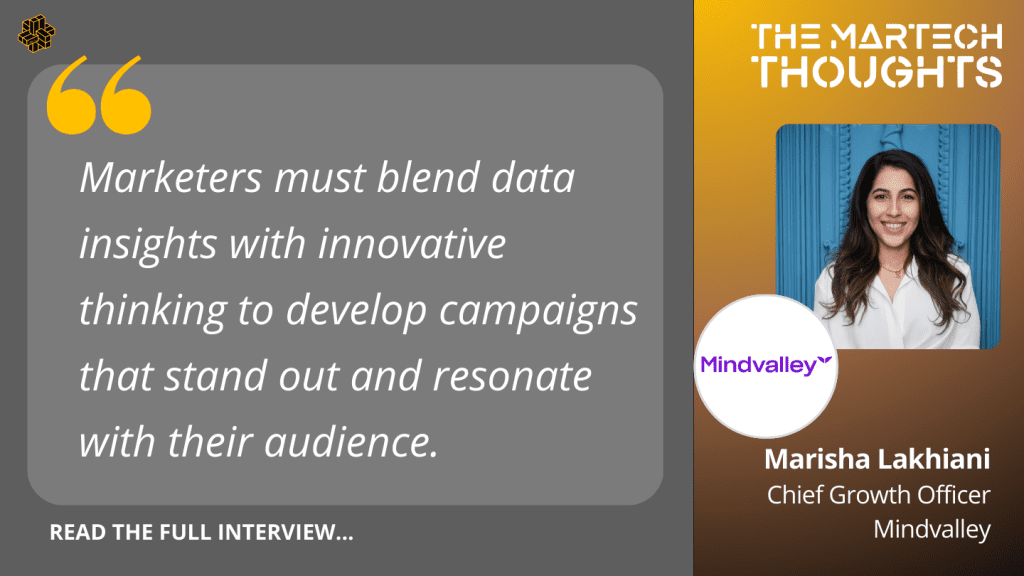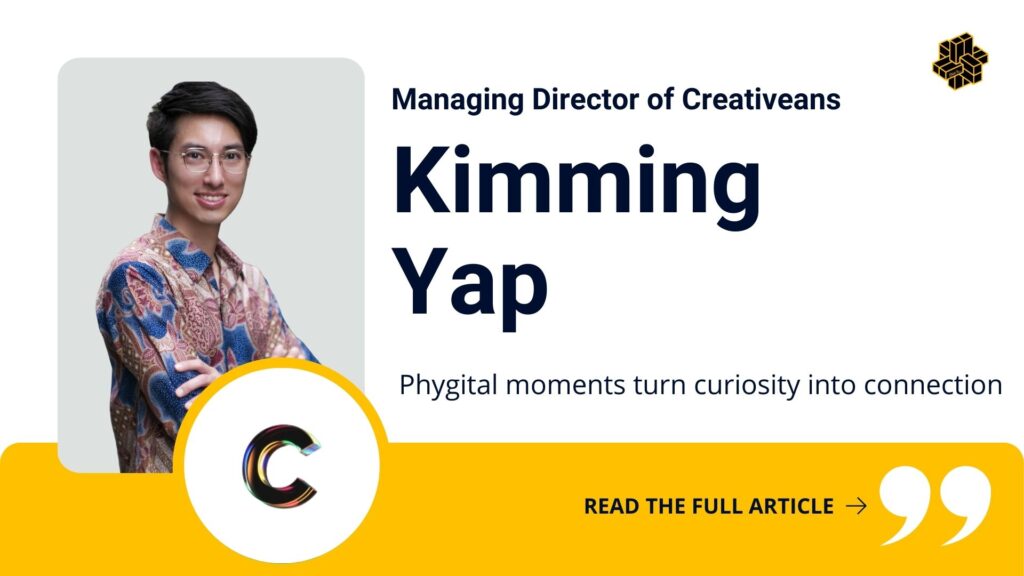
Welcome Marisha Lakhiani, Chief Growth Officer at Mindvalley, shares her thoughts on the essential role of AI in digital marketing, customer retention strategies, and how technology is transforming the marketing profession as part of the MarTech Thoughts series.
Currently, what are you primarily looking for in your digital marketing efforts? Awareness, engagement, conversion, or retention? Why?
Currently, I’m primarily focused on retention in my digital marketing efforts. Retaining existing customers is crucial because it’s often more cost-effective than acquiring new ones. By fostering loyalty and delivering continuous value, we can build long-term relationships, increase lifetime customer value, and turn satisfied customers into brand advocates.
At your organisation, what marketing tasks are suitable for automation, and which tasks still need a human touch? Is there any part of the marketing process that includes AI?
We leverage automation to enhance efficiency and streamline various marketing tasks. For instance, dubbing content is an area where automation excels. AI tools handle voiceovers and translations efficiently, maintaining consistent quality while saving significant time. Similarly, writing scripts can be automated to some extent. AI generates initial drafts or suggestions based on predefined parameters, though human editing is essential to ensure that the final script aligns with our brand voice and messaging.
Analysing ad performance is another task well-suited for automation. AI and machine learning algorithms can process vast amounts of data, identify patterns, and provide actionable insights on ad performance. Additionally, turning blogs into podcasts can be automated with AI tools that convert written content into audio formats. However, human oversight is crucial for quality control and to ensure that the audio accurately reflects the intended message.
Despite these advancements, certain tasks still require a human touch. Strategic decision-making, for example, relies on human judgment to interpret data and make informed decisions. Creative direction is another area where human creativity and intuition are irreplaceable, as developing innovative content ideas often requires a unique perspective that AI cannot fully replicate. Personalisation of content, tailored to resonate with specific audience segments, also benefits from human insight to capture nuances and cultural context. Ensuring consistency in brand voice and messaging requires human involvement to accurately reflect the brand’s personality and values.
AI plays a significant role in various aspects of our marketing process. It provides valuable customer insights by analysing data to identify trends, preferences, and behaviours. AI-powered chatbots handle routine customer inquiries and support tasks, improving customer service efficiency. Additionally, AI algorithms recommend content to users based on their behaviour and preferences and help target ads more precisely and optimise ad spend based on performance data. By integrating AI into these tasks, we can streamline processes, enhance efficiency, and allow our team to focus on higher-level strategic activities.
What are some of the significant changes to your customer outreach and retention strategies? And how has it impacted the growth plan for upcoming years?
In recent years, our customer outreach and retention strategies have undergone significant changes to adapt to evolving consumer behaviours and technological advancements. One of the most notable shifts has been the move towards personalised and data-driven approaches. We now leverage advanced analytics and AI to gain deeper insights into customer preferences, behaviours, and needs. This has allowed us to create highly targeted marketing campaigns and deliver personalised content that resonates more effectively with our audience.
Our outreach strategy has also become more multi-channel and integrated. We now utilise a combination of email marketing, social media, content marketing, and paid advertising to engage with customers across various touchpoints. This multi-channel approach ensures that we reach our audience where they are most active and provides a more cohesive and consistent brand experience.
In terms of retention, we’ve focused on enhancing customer experiences through improved customer support, loyalty programs, and regular engagement. Implementing AI-driven chatbots has streamlined customer service, providing instant support and resolving issues more efficiently. We’ve also introduced personalised loyalty programs that reward customers based on their behaviour and preferences, encouraging repeat purchases and long-term engagement.
These changes have significantly impacted our growth plan for the upcoming years. By leveraging data to drive personalisation and adopting a multi-channel approach, we have seen increased customer engagement and higher conversion rates. Enhanced customer support and loyalty initiatives have improved retention rates, creating a more stable and predictable revenue stream. As a result, we are well-positioned for sustained growth and have been able to allocate resources more effectively to scale our efforts and explore new market opportunities. Our focus on data-driven strategies and personalised experiences continues to drive our growth, enabling us to meet and exceed our objectives in a competitive landscape.
How do you see the skillsets needed for the marketing profession changing?
The skillsets needed for the marketing profession are evolving rapidly, driven by advancements in technology and shifting consumer expectations. In this changing landscape, two critical skillsets stand out:
Utilising Creativity in Decision Making: As marketing becomes increasingly data-driven, the ability to harness creativity in decision-making processes is more important than ever. Marketers must blend data insights with innovative thinking to develop campaigns that stand out and resonate with their audience. Creativity is not just about coming up with eye-catching ideas; it’s about applying creative solutions to solve complex problems and engage customers in meaningful ways. This involves designing compelling narratives, creating unique content, and finding inventive ways to leverage emerging technologies.
Prompting AI Effectively: With the rise of artificial intelligence in marketing, knowing how to prompt AI effectively has become a crucial skill. This means understanding how to use AI tools to analyse data, generate insights, and automate tasks while ensuring that the outputs align with strategic goals. Marketers need to be adept at crafting clear, precise prompts for AI systems to achieve accurate and actionable results. This skill involves not only technical proficiency but also a deep understanding of how to interpret AI-generated data and integrate it into broader marketing strategies.
In essence, the future of marketing will require a blend of creativity and technological savvy. Marketers must be able to use their creative instincts to guide AI tools and data-driven insights, ensuring that their strategies are both innovative and effective. As the field continues to evolve, those who can adeptly combine these skills will be best positioned to drive impactful marketing campaigns and achieve success in an increasingly competitive environment.
Please share with us one of the best campaigns you have seen recently or your all-time favourite campaign, and tell us why.
One of my all-time favourite campaigns is the “Tampon Book” campaign. This innovative initiative was more than just a marketing effort; it was a powerful statement on social impact and education. The campaign involved creating a book made entirely out of tampons, which was then used to educate and raise awareness about menstrual health.
Here’s why this campaign stands out:
Impactful Message: The campaign tackled a crucial social issue—menstrual hygiene—by using a medium that was both unexpected and attention-grabbing. It raised awareness about menstrual health in a creative and thought-provoking way.
Creative Approach: The idea of using tampons as a book’s literal material was bold and original. This creative approach not only captured attention but also sparked conversations about a topic that is often considered taboo.
Educational Value: Beyond its artistic and marketing elements, the campaign served an educational purpose. It provided valuable information on menstrual health and hygiene, contributing to greater understanding and reducing stigma.
Social Impact: The campaign highlighted the importance of addressing menstrual hygiene issues and supported efforts to improve access to menstrual products. It demonstrated how marketing can be used as a tool for social change and impact.
Overall, the “Tampon Book” campaign is a prime example of how creative marketing can make a meaningful difference and drive conversations around important social issues. Its blend of innovation, education, and impact makes it a standout campaign in my view.
What are the key challenges when implementing new technologies or platforms for the first time in your company, and do you have any suggestions for making the process smoother?
Implementing new technologies or platforms for the first time in a company can present several key challenges. Here are some of the main issues and suggestions for making the process smoother:
Integration Issues
Integrating new technologies with existing systems and workflows can be one of the most significant challenges during implementation. Compatibility issues often arise, potentially causing disruptions or inefficiencies in current operations. To address these issues, it’s crucial to develop a detailed integration plan. This plan should involve close collaboration between IT and relevant departments to ensure that the new technology aligns seamlessly with existing systems. Testing the integration in a controlled environment before full deployment can help identify and resolve potential conflicts. Additionally, maintaining clear communication channels throughout the process will help address any concerns promptly and keep all stakeholders informed.
Vendor Reliability
Vendor reliability is another critical factor in the successful implementation of new technologies. Relying on external vendors introduces risks related to support, updates, and the long-term viability of the technology. To mitigate these risks, it’s essential to choose vendors with a proven track record of reliability and excellent support. Thoroughly evaluate potential vendors by reviewing their service level agreements (SLAs) and seeking references from other clients. Establish clear expectations for support and ensure that the vendor provides comprehensive documentation and training. Building a strong relationship with the vendor and having a contingency plan in place can also help manage any issues that arise, ensuring a smoother transition and ongoing support for your new technology.
What is the most effective use of technology you’ve seen in navigating today’s rapidly changing and diverse world?
The most effective use of technology I’ve seen recently in navigating today’s rapidly changing and diverse world is the launch of Meta’s Advanced Sales Campaigns (ASC) and Google’s Performance Max (PMax) campaigns.
Meta’s ASC allows businesses to optimise their advertising strategies with advanced targeting and automation, enabling them to reach the right audience more effectively and efficiently. This technology leverages AI to enhance ad performance by analysing user behaviour and engagement patterns, making it easier for marketers to refine their strategies and improve ROI.
Similarly, Google’s PMax campaigns represent a significant leap forward by utilising machine learning to automate and optimise ad placements across Google’s entire inventory, including Search, Display, YouTube, and Discover. This comprehensive approach ensures that ads are served to the most relevant audiences, maximises conversions, and simplifies campaign management for businesses.
ASC and PMax demonstrate the power of integrating advanced AI and automation into marketing strategies. They provide actionable insights, streamline processes, and enhance targeting precision, allowing businesses to navigate the complexities of today’s digital landscape with greater agility and effectiveness.
A big thank you to Marisha Lakhiani, Chief Growth Officer at Mindvalley, shares her thoughts on the essential role of AI in digital marketing, customer retention strategies, and how technology is transforming the marketing profession. If you want to connect with Marisha, feel free to reach out via LinkedIn!
See more MarTech Thoughts interview pieces here!
Last updated: October 2024













